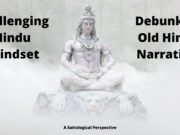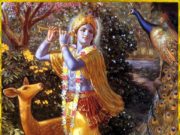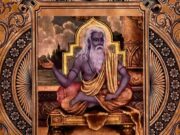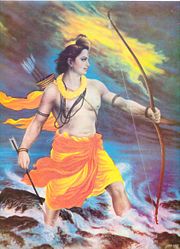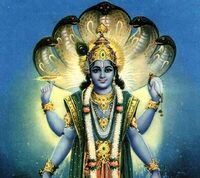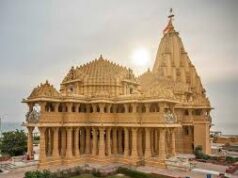Being a Hindu, Buddhist and other allied dharmic faiths, has become difficult for many practitioners of Dharma.
Dharma is the connecting principle from all faiths originating from Vedas.
Any one who knows Vedas will appreciate the openness in which Vedas discuss all issues. The inherent nature of Vedas is objectivity, subjectivity with rationality. That makes a powerful combination for intelligent people to naturally get drawn towards Dharma.
Directly or directly, there are more than 90 million followers of Dharmic philosophies in USA.
And this movement towards dharma is becoming stronger by the day. The natural inquisitiveness of a person is directly fulfilled by Vedic literatures. I recently met with a person on flight, and he asked me, “what type of beads that you are using?” I replied that “these are tulsi beads and we use them regularly for our mediation.” His inquisitiveness rose and he asked me, “what faith are you from?” I told him that “I follow Hinduism”. His immediate question to me was “I was taught that Hindus are idolators and have no religious practice”. I asked him what was his faith. He replied that “he was a Muslim”. Then, I added, as per your faith, I am considered as a kafir. For those who won’t know that Kafir is considered an atheistic and faithless person in Islamic texts and good Muslims are usually indoctrinated from childhood to not mix with kafirs. He immediately asked the flight attendant to change his seat.
Usually, most dharmic people are highly educated and are usually very very accommodative of other faiths.
Any one from any faith can easily become dharmic because dharma doesn’t discriminate. That’s the beauty of Dharma. The dharmic philosophy creates a balanced individual.
Also, dharma also assumes that everyone has an individual spiritual path which they are entitled to seek. Which, naturally brings in freedom to choose and also brings in responsibility.
How would have other dharmic people handled this? Most Hindus and Buddhists I know, never judge anyone else by faith. Faith is just considered a personal choice. It is not usually considered important. Many Hindus and Buddhists are generally shy to speak about their faith to anyone unless they are asked. Usually, even when they are asked, they describe the cultural aspect more than the philosophical aspect. So a generally, when they are asked about their faith they will probably give the least amount of information out of deep civility. A Hindu may say that I worship Vishnu or Shiva or Ganesh, and then he will add a qualifier that God is one for all. The non-dharmic person that he is speaking with will interpret this in a totally opposite way. The non-dharmic person immediately asks, “I have heard that you have many gods.” At this time, the Hindu person becomes defensive and gets into a larger explanation that further expands into the next challenging question by non-dharmic person, “I have heard that you have a caste system.” At this time, Hindu defends,”Caste system is not by birth but it’s due to qualities and qualification. It’s misused by some people, not majority.” That is usually the end of discussion. But, have we wondered that from where these questions are springing up in the minds of non-dharmic people. The answer to that question will baffle you to say the least.
It’s the centuries old philosophical insecurity and indoctrination since childhood of non-dharmic people that makes them believe that they are the people of faith and all others have no faith.
In their sermons, text books and their preaching they are taught that they are exclusive chosen people. Very little information is given to them about other native cultures and spiritual practices. When they meet a Hindu or Buddhist or any other spiritual practitioner, they are surprised. Because probably they are meeting them for the first time. Their inquisitiveness often throws similar questions.
The concept of polytheism, pantheism and idolatry is considered heretic to a large extent in their books because their books were designed by their men to make them exclusive.
This exclusivity makes them entitled to consider themselves as special and more advanced than other people. This exclusivity often drives them to violent acts against native people. History is evidence of violent Islamic conquests against Levant, Persia and South Asia. Also, violent Christian racist propaganda against native cultures in the Americas, South Asia and many other parts of the world. The philosophical maturity of Dharmic literatures makes their books look very artificial and incomplete. That’s the biggest insecurity of their teachers. So the only way they can maintain their so called superiority is by teaching a false sense of exclusivity through indoctrination. Things like, monotheism, belief in their version of god and superior belief in their book are drilled into the minds of all their followers. They institutionalize the propaganda at all levels to maintain their followers. Criticism of Dharmic traditions, philosophy, and culture is a part of that education to instill a sense of fear of losing their exclusivity. It’s sort of a negative propaganda to protect their egotistical belief in exclusivity. Monetary benefits, Community benefits are usually created to help retain people which otherwise will naturally be drawn towards dharmic traditions. A culture of false pride is taught. Also, they force themselves on all religious bodies and educational bodies of Dharmic people to weaken their philosophy.
The dharmic traditions lose followers to this institutionalized propaganda because sometimes they don’t understand the purpose behind those questions.
It’s also an opportunity to train non-dharmic people about dharmic culture and philosophy. It’s important to design simpler curriculums to remove this false propaganda and present a stronger face to people of non-dharmic traditions. The western societies are built around entitlement and rights. Even though dharmic traditions are built around the core philosophy of karma, but for the sake of equal treatment, dharmic people have to demand rights and be entitled to certain privileges.
Few things that need to be done by dharmic communities forcefully:
- Demanding cultural rights on food
- Demanding fair representation in government religious bodies such as USCIRF
- Demanding the correction of documented native history in all State and school curriculums
- Removal of non-dharmic people on Academic bodies of Dharma
- Last but most important, giving cultural pride to their children and explaining them core differences between their faith and the faith of non-dharmic people
Everything is not the same, otherwise God wouldn’t have created a diverse world. The fight between Dharmic and Abrahamic faiths has just come out in open because Dharma is now defending.


